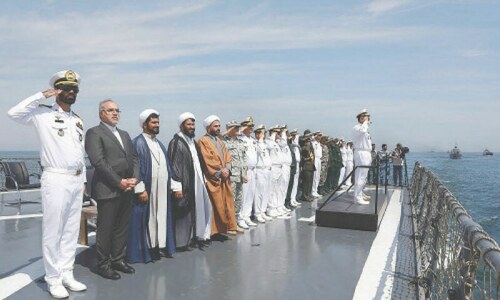WASHINGTON: Legendary philanthropist Abdul Sattar Edhi’s life was a sharp contrast to those who use fear and violence to create divisions, says the White House.
In a rare tribute to Mr Edhi, Ned Price, a spokesman for the White House National Security Council, described him as one of the world’s great humanitarians.
“Mr Edhi led a life dedicated to serving others, and his determination to provide equal treatment for all regardless of nationality, ethnicity, religion or class stands as a sharp rebuke to those who would use fear and violence to create divisions,” he said in a statement.
Mr Edhi passed away on Friday night in Karachi, after a prolonged battle with renal failure.
Philanthropist’s accomplishments from setting up a clinic to world’s largest voluntary ambulance fleet acknowledged
He was accorded a state funeral with hundreds of thousands of people, including President Mamnoon Hussain and Army Chief General Raheel Sharif, attending the funeral prayer.
The White House noted that from the medical clinic he established in Karachi, almost 60 years ago, Mr Edhi and his wife created a vast network of social services for Pakistan’s most vulnerable, encompassing nursing homes, orphanages, soup kitchens, maternity wards, women’s shelters, rehabilitation centres, and the largest voluntary ambulance fleet in the world.
“Even as his foundation’s operations expanded beyond Pakistan’s borders, Mr Edhi still often drove his own ambulance, personally caring for the injured,” Mr Price added.
“We offer our condolences to Bilquis and their four children, the millions of people around the world whose lives he touched, and to the people of Pakistan, who have lost a heroic servant of humanity,” he said.
Since his death, leading US publications have also appreciated Mr Edhi’s work, calling him “a beacon of hope” against forces of despair and hate.
America’s three major newspapers — The New York Times, The Washington Post and Wall Street Journal — underlined his decades of services to the destitute through one of the world’s largest networks of charity, The Edhi Foundation.
The NYT noted that Mr Edhi’s name had become synonymous with charitable causes and because of his services he had achieved an almost saintly status in Pakistan.
WSJ highlighted his simple life, his wish to be buried in the same simple clothes he wore and his decision to donate his organs. The newspaper noted that in his autobiography Mr Edhi recalled telling a friend in the 1950s: “I have to do something for the people in Pakistan. The selfish ways that the best of us have taken to, has heightened my passion to serve them.”
The Washington Post called Mr Edhi “a beacon of hope in a country too often mired in despair”.
The newspaper noted that he was “an ascetic in a country where politicians regularly skim millions of dollars through corruption; a humanitarian in a country rife with sectarian hatred and violence; and ultimately the provider of public services in a country where the government often fails to provide even the most basic ones, like adequate hospitals and ambulances”.
The paper also noted that in the course of his lifetime, Mr Edhi had “gone from being a refugee to running Pakistan’s most renowned philanthropic organisation”.
Published in Dawn, July 12th, 2016

















































